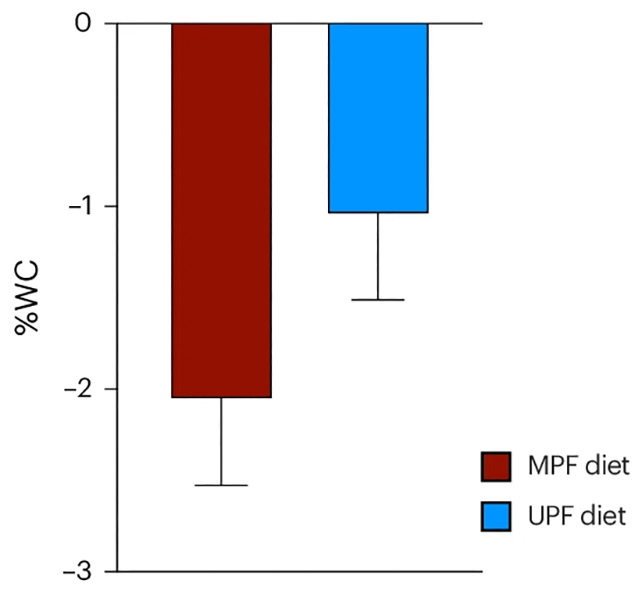Ultra-processed foods already have a lousy reputation – and now a new study suggests that even ‘healthy’ versions of them can significantly undermine your weight-loss efforts.
Researchers from the UK and US analyzed data from 50 overweight people who completed two diet programs on separate occasions. Both diets matched in terms of nutrition – with the same amounts of fat (including saturated fats), carbs, fiber, salt, and even fruits and vegetables.
The key difference is one diet was built around ultra-processed foods (UPFs), and the other focused on minimally processed foods (MPFs). The UPF diet included the likes of breakfast oat bars and lasagne ready meals, while the MPF one featured overnight oats and homemade spaghetti bolognese.
Related: Ultra-Processed Foods Linked to Early Signs of Parkinson’s Disease
Both diets resulted in weight loss. But the MPF diet was associated with shedding twice as much weight as the UPF diet, on average. Participants also lost more unhealthy body fat while on the MPF diet and reported better control over unhealthy food cravings.
“Previous research has linked ultra-processed foods with poor health outcomes,” says clinical scientist Samuel Dicken, from University College London (UCL). “But not all ultra-processed foods are inherently unhealthy based on their nutritional profile.”
“The main aim of this trial was to fill crucial gaps in our knowledge about the role of food processing in the context of existing dietary guidance, and how it affects health outcomes such as weight, blood pressure, and body composition, as well as experiential factors like food cravings.”

While the overall reductions in weight were only 2 percent for the MPF diet and 1 percent for the UPF diet, the researchers point out the short timespan of the study: eight weeks for each diet, with a gap of four weeks in between.
The changes seen here could quickly add up. In combination with other factors that contribute to a healthy and effective diet, avoiding ultra-processed foods could make a noticeable difference over time.
“Though a 2 percent reduction may not seem very big, that is only over eight weeks and without people trying to actively reduce their intake,” says Dicken.
“If we scaled these results up over the course of a year, we’d expect to see a 13 percent weight reduction in men and a 9 percent reduction in women on the minimally processed diet, but only a 4 percent weight reduction in men and 5 percent in women after the ultra-processed diet.”
The trial was relatively small and excluded people with dietary restrictions, but it offers more evidence on how we can tackle our growing obesity crisis – and highlights the difference that following nutritional guidelines in diets can have.
“The global food system at the moment drives diet-related poor health and obesity, particularly because of the wide availability of cheap, unhealthy food,” says Chris van Tulleken, a global health and infection researcher at UCL.
“This study highlights the importance of ultra-processing in driving health outcomes in addition to the role of nutrients like fat, salt, and sugar.”
The research has been published in Nature Medicine.
Source link

